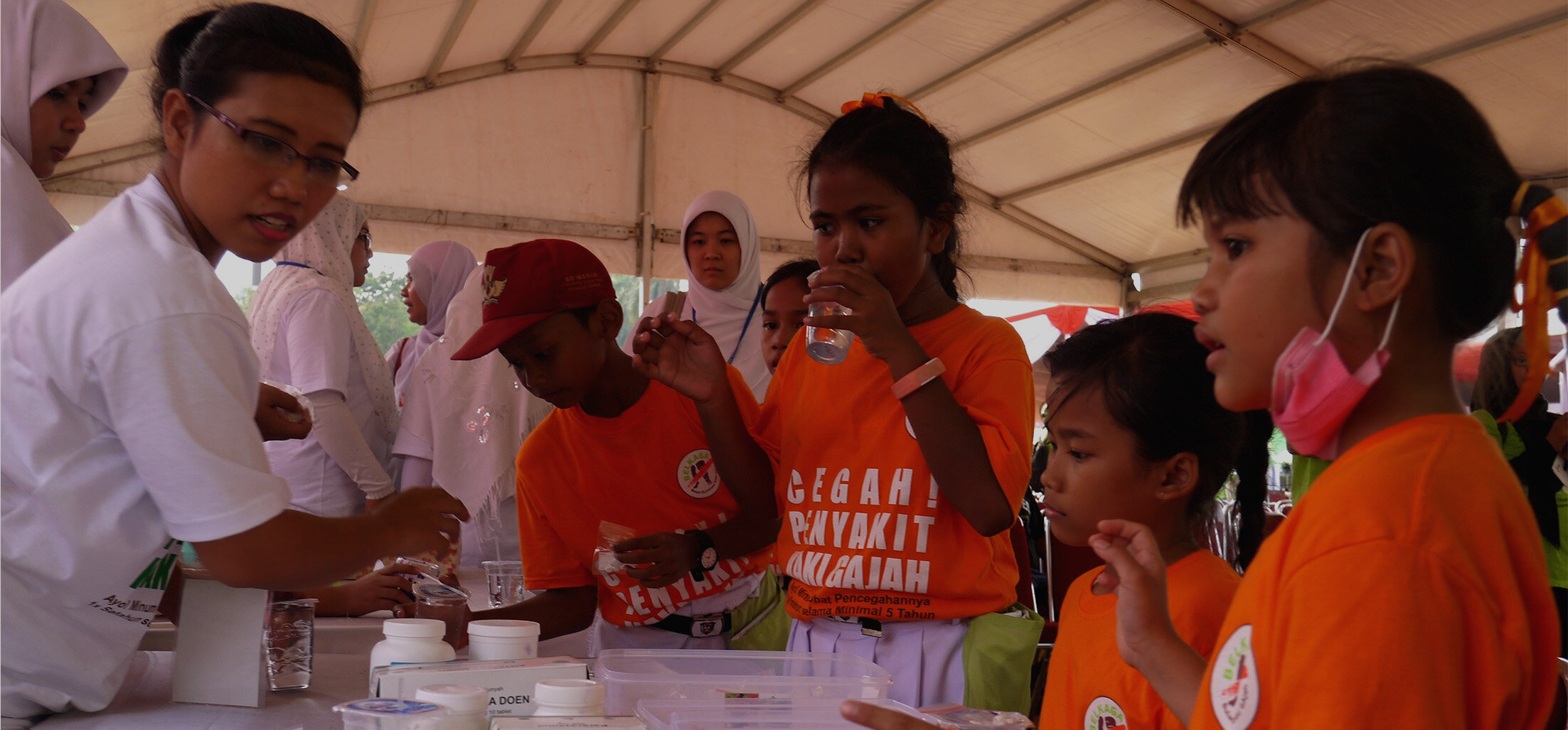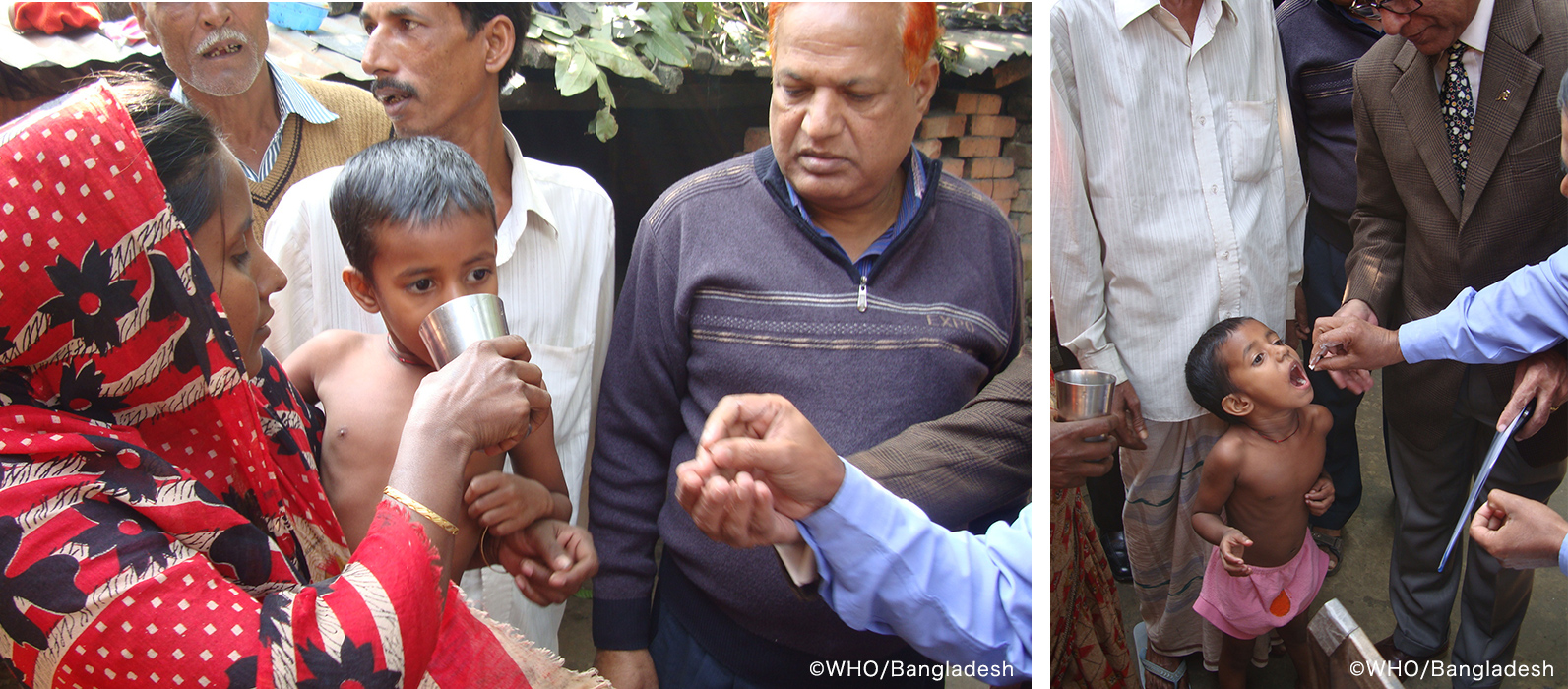
- New
Eisai: Towards an NTD-free world
Since 2013, Eisai has been providing treatment for lymphatic filariasis (LF) free of charge to high-risk populations, to contribute to the global elimination of the disease. Eisai estimates that in just 5 years, it has impacted the health and wellbeing of over 19 million individuals, significantly improving in the standard of living and productivity, equating to 7 trillion JPY of social value created over the lifetime of these individuals. Despite providing treatment at no cost, Eisai quickly found the initiative profitable in the short-term, with further long-term benefits expected.
Eisai's Commitment to
Human Health Care
For Eisai, purpose and profit have always been inextricably linked. But in 2005, the leading Japanese pharmaceutical company decided to formalize this relationship and became the first company in the world to incorporate its corporate philosophy, human health care, into its Articles of Incorporation. Eisai is now fully empowered to build a business strategy which created financial value for shareholders by first meeting the needs of "the People" - patients and the public at large.
Eisai's CEO, Haruo Naito, said, "With our corporate philosophy we are aiming to realize social good with efficiency. In the case of Eisai, we define social good as 'Relieving people's anxiety over health', 'Reducing health disparities' and 'Realizing empathy with patients.' Tackling Global Health issues represents an opportunity to live our corporate philosophy, creating real impact for "the People" and long-term corporate value." Through deep engagement with senior leaders at the World Health Organization (WHO), Mr. Naito, identified access to medicines as a critical gap in addressing the unmet medical needs of Neglected Tropical Diseases (NTD). Furthermore, Eisai believed it was uniquely positioned to create solutions to this gap. In 2010, Eisai partnered with the WHO and agreed to provide treatment for the NTD lymphatic filariasis (LF) free of charge.
LF impairs the body's lymphatic system, causing pain and disability in affected individuals. Over 882 million people in 44 countries are threatened by LF, however LF can be eliminated through prophylactic chemotherapy and care can alleviate symptoms in chronic cases.1 In 2013, Eisai began providing LF treatment in the form of DEC (diethylcarbamazine) tablets free of charge to people at risk of contracting LF. As of FY2022, Eisai had provided approximately 2.1 billion DEC tablets. Mr. Naito said, "We continue to remain committed to providing treatments against LF until it is eliminated."
As an extension of its corporate purpose, Eisai strives to ensure it stays closely engaged with patients. Each year, all Eisai employees are encouraged to spend time interacting directly with patients. Eisai was well aware of the impact it was having on communities at risk of LF. However, Eisai wanted to measure and quantify its impact to better communicate it to their external stakeholders. Applying an Impact-Weighted Accounting approach, Eisai estimated that between 2014-2018, more than 19 million individuals benefitted from DEC treatment - representing approximately 7 trillion JPY2 of social value, experienced over their lifetimes, for these individuals.3
Creating Corporate
Value through Impact
Eisai received accolades and public recognition for its activities. However, media, analysts, and investors often questioned whether these activities were simply philanthropic or whether they affected Eisai's valuation or earnings guidance.
For Eisai, the commitment to LF elimination was a business decision with multiple pathways for driving financial value. In the long term, Eisai expected DEC tablet donations would increase brand value in emerging markets and help develop a middle-income population. But this was not purely a long-term value creation strategy. Eisai was producing DEC tablets at its Vizag plant in India. By showing employees that they were creating social value by helping to treat LF, Eisai saw higher productivity through increases in retention, skills development, and overall motivation. As a result, the cost of manufacturing at its Vizag plant were reduced due to increased operation rate. Since 2018, Eisai's DEC tablet commitments have been profitable in its management accounting, thanks to production efficiencies.
Former Eisai CFO, and current Senior Advisor, Dr. Ryohei Yanagi, reflected on Eisai's work to eliminate LF. "Our mission is serve our patients and the people. If we create value for them, our business will reap the rewards as a result. This cause-and-effect sequence is critical. By first focusing on addressing the unmet medical needs and enhancing patient satisfaction, then as an outcome, we build a sustainable business model aligned with long-term growth. Our DEC initiative, while technically a donation, is not philanthropy, it is simply a long-term investment for long-term value creation. We are helping change the lives of millions of people, and Eisai is already benefiting, and will continue to do some long into the future."
Eisai's continued efforts to combat NTDs are rooted in the company's purpose and materiality. As such, Eisai has demonstrated the link between value and investing in Global Health. By incorporating impact accounting into their project evaluation and measurement process, Eisai was able to evaluate how projects create value not only for customers and patients but also investors, analysts, and employees. Eisai showcases that investments in Global Health should not be viewed as a donation, or philanthropy, but should be an integral part of a long-term strategic vision.
1World Health Organisation. (2023). Lymphatic filariasis (who.int).
2This represents an average annual value creation contribution of approximately 160 billion yen.
3For more information, please review Yanagi, R. and Freiberg, D., "ESG Accounting for offering neglected tropical disease treatment with price zero - innovative measurement of product impact accounts in global health." Capital Markets Monthly. September 2022.

